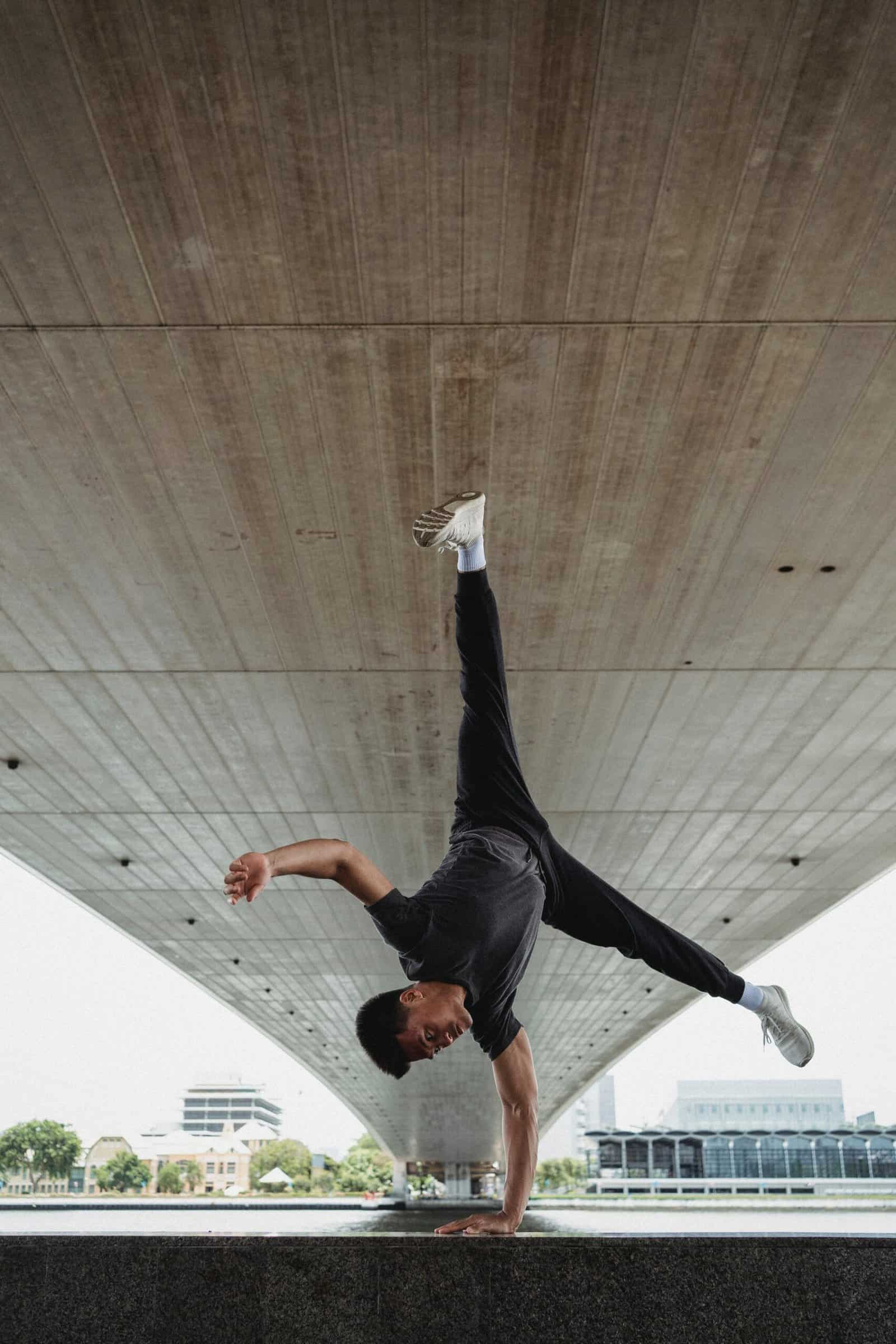
Learning Acrobatics and Developing Elasticity
Movement overlaps. Brain work = joint work = speed, power, strength, and coordination work. We have structures and we have capacities. Our practice establishes the abilities of both. There is a general consensus that if your parts work better you’ll be able to perform better and do better things. But what exactly would you DO with a body free from pain and restriction? If you were to wake up tomorrow exactly as you wished you could be, how would your day be different then it is right now?
A ready body craves an objective of pursuit. By definition, preparation has a purpose. There was a time when all I wanted was to get back to where I used to be. Then I simply hoped to keep practicing and playing. Now, I seek nothing but to learn and develop new skills. I want to try everything that my sheltered athletic existence deprived me of.
The physical intelligence of acrobatics mystifies me. The seamlessness of control and intent and explosiveness is riveting. It offers up an unspoiled and exciting world to enter into. When your body is the instrument, your interpretations of functionality vary. The spectrum is exquisite, endless, and enterprising:
https://www.facebook.com/marlo.fisken/videos/10102973423731907/
Each of these people have a comprehensive understanding of how they are doing what they’re doing, because it’s repeatable. They’ve systemized their practice because they can teach it. Meta-cognition is the real reason these folks are so special. They can explain, organize, and justify their movements.
Teachable systems all evolve out of an individual’s experience and perspective. An interpretation takes place. Explaining your own approach allows you to recognize and arrange the process in which you think. This is a big reason why I enjoy writing. It serves as a reflection that helps me clarify what my body and brain organically create and synthesize. My actions are hardly linear, but in stepping back and analyzing a body of work on a similar topic, I can make sense out of spontaneous ideas and structure them in a followable format.
The subsequent progression represents one such model of deconstruction and reassembly.
Developing Elasticity
I begin venturing into the unknown by connecting it to a known strength. The hope is that the confidence of the movement can lead me to a new familiarity. Throwing is my strongest elastic skill. To capitalize on this, I placed my body into a foreign position and noted any loss of speed or snap:
I learned that the same side leg must work in conjunction with the throwing arm to maximize velocity of the ball.
I then used the coordination on my right as a comparative to teach the skill to the left side. The non-dominant side needed more repetition and multiple minute adjustments to feel similar. This translated to more intentional practice and more assurance the left side of my body can match the ability of my right. More importantly, it convinced me that my body is capable of learning and I am capable of teaching it.
Competency is built in pieces and phases.
Looking at the lower half, I needed a bit more breakdown into smaller segments.
First, the hamstring and hip swing:
As the leg travelled back and forth I attempted to store rotational elasticity in my upper body.
From here, I tried to use the kinetic energy in the hamstring to act as a bridge toward the body leaving the ground and inverting the body’s orientation. It laid the foundation for horizontal propulsion and braking:
Next, I added in a rotational component; by far the most difficult to coordinate:
Each level of success leads to a boldness to find the next step. In this progression, it was a whipping action that compelled me to leave the ground and go for a full handstand hold:
Every goal or aspiration can be broken down into manageable fragments. Whether they are given or created, the uniqueness comes from how you integrate and organize information. Your thinking must come into play. The internal dialogue we have with ourselves keeps engaged and resourceful in path finding and problem solving. It’s how we go from here to there, creating and managing all the little steps along the way.
Viewing movement as the development of skills rather than an accomplishment of feats makes every practice an experience.
The way we use our body construes our belief of what it is able to do. Novel tasks encourage novel ideas and lure us to #thinkmovement. Digging into your weaknesses helps you understand, articulate, and appreciate all the options an able body has before it. Investigating begs us to engage in other questions and ideas. Possibilities abound in a cooperative context.
The more I learn and comprehend, the larger my worldview gets, and the more I can give away as a confident truth. Sharing is the impetus for everything. It illustrates our desire to include and be included, formulating a grander notion of who we are, what group we belong to, and what our actions represent. A collective of many parts will promote a mutual reverance of each.



